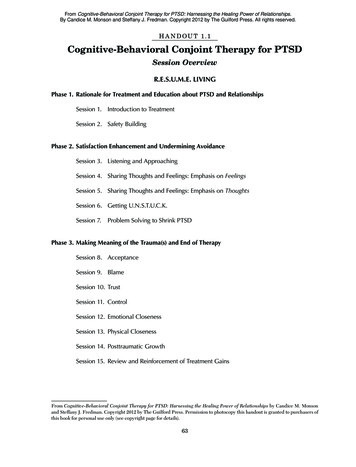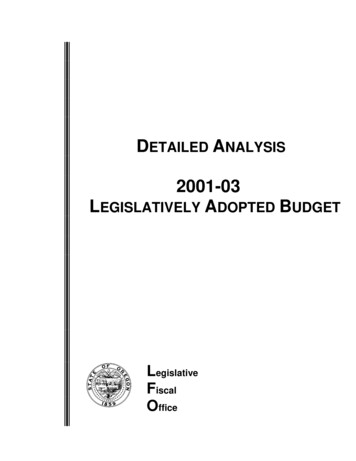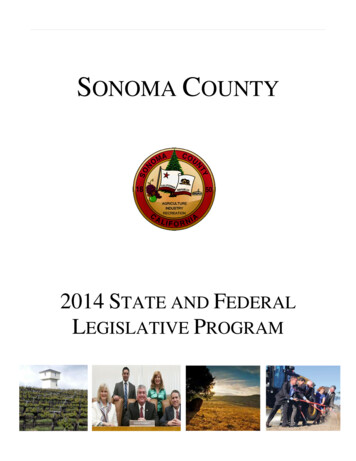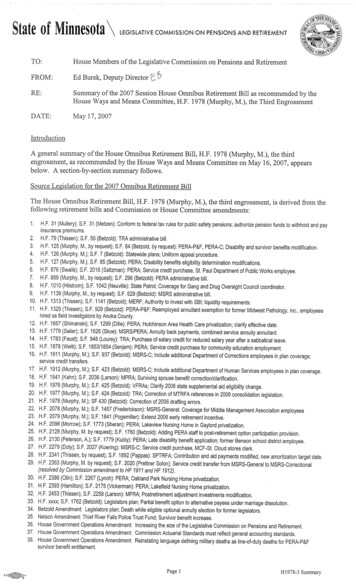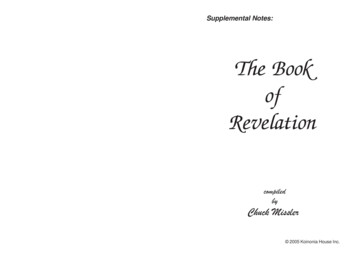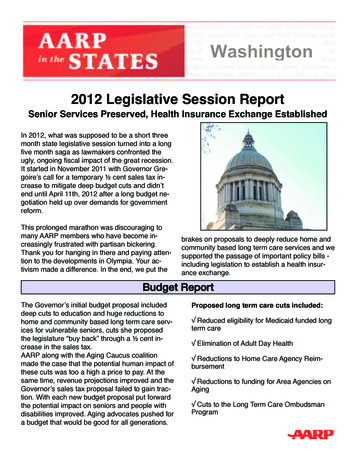
Transcription
2012 Legislative Session ReportSenior Services Preserved, Health Insurance Exchange EstablishedIn 2012, what was supposed to be a short threemonth state legislative session turned into a longfive month saga as lawmakers confronted theugly, ongoing fiscal impact of the great recession.It started in November 2011 with Governor Gregoire’s call for a temporary ½ cent sales tax increase to mitigate deep budget cuts and didn’tend until April 11th, 2012 after a long budget negotiation held up over demands for governmentreform.This prolonged marathon was discouraging tomany AARP members who have become increasingly frustrated with partisan bickering.Thank you for hanging in there and paying attention to the developments in Olympia. Your activism made a difference. In the end, we put thebrakes on proposals to deeply reduce home andcommunity based long term care services and wesupported the passage of important policy bills including legislation to establish a health insurance exchange.Budget ReportThe Governor’s initial budget proposal includeddeep cuts to education and huge reductions tohome and community based long term care services for vulnerable seniors, cuts she proposedthe legislature “buy back” through a ½ cent increase in the sales tax.AARP along with the Aging Caucus coalitionmade the case that the potential human impact ofthese cuts was too a high a price to pay. At thesame time, revenue projections improved and theGovernor’s sales tax proposal failed to gain traction. With each new budget proposal put forwardthe potential impact on seniors and people withdisabilities improved. Aging advocates pushed fora budget that would be good for all generations.Proposed long term care cuts included: Reduced eligibility for Medicaid funded longterm care Elimination of Adult Day Health Reductions to Home Care Agency Reimbursement Reductions to funding for Area Agencies onAging Cuts to the Long Term Care OmbudsmanProgram
Finally, after a special session and prolongedbudget negotiation, lawmakers passed budget(3ESHB 2127). At the end of the day lawmakerswere able to spare deep cuts to both health careand education. Notably, none of the long termcare cuts proposed by the Governor and includedin subsequent proposals were adopted. Overtime, the deficit was whittled away by higher thanexpected tax receipts, lower than expected caseloads for state services and accounting maneuvers.Chief Budget WritersIn the SenateThe final budget included: No cuts to home and community basedlong term care and preservation of theBasic Health Plan and the Disability Lifeline Program.Senator Ed Murray D-43rd No education cuts or reductions in funding public schools, colleges or universitiesSenator Joseph Zarelli R-18th A Budget Maneuver: Instead of skippinga pension payment or delaying the K-12apportionment payment by one day, lawmakers opted for a less controversial accounting change related to how sales taxmoves from the state to cities and counties.Reform Demands Held UpBudget NegotiationsThe dramatic moment of the 2012 sessioncame when three conservative Democratssided with Republicans and used an obscureprocedural maneuver called “the 9th order” totake control of the majority Democrat Senate.Their demand for government reform held uppassage of the budget through a month longspecial session. A Little Revenue: There is some new revenue, including 12 million from cigarettemanufacturing, 14.5 million in closure ofthe first mortgage tax deduction for big outof-state banks, and 6 million from a voluntary property tax amnesty program.At the end of the day lawmakers agreed to andpassed the following bills in order to break thebudget impasse: An Ending Fund Balance: A lower thanexpected 319 million ending fund balancehelped to bridge the gap. Eliminating early retirement option forstate employees (SB 6378) Restructuring health benefits for schoolemployees (SB 5940) Balanced budget requirements (SB6636)2
Long Term Care: Don’t “Unreform”today, despite a huge increase in the 85 population.In many ways “reform” was the buzz word of the2012 session. What started as a demand for “reform before revenue” turned into an ultimatum of“I won’t vote for a budget until you approve myreform bills.”aWashington serves 2.3x more consumers per dollar in home and communitybased settings, as compared to nursing homesettings.Aging advocates turned this buzz word on itshead and used it as an opportunity to educatelawmakers that when it comes to long term care,we have already experienced a dramatic “quietreform” that is saving the state billions. We toldthem that the last thing we should consider arecuts that will turn the clock backwards on thesereforms and drive people to more expensivenursing home care. We shared these simplefacts:aOur successful move away from expensive nursing home care has saved an estimated 3.34 billion from 1996 to present day.aWashington’s successful long term caresystem ranks 2nd in the nation, we lead thecountry in choice of settings and providers and insupporting family caregivers.aOur system is both popular and cost effective, Washington ranks 30th in per capitaspending on long term care.aWashington states’ nursing homecaseload has dramatically declined from morethan 17,000 in 1992 to approximately 10,000chart source: Office of Financial ManagementAARP Weighs in on Policy Change in Long Term CareThroughout the legislative session, AARP engaged in important discussions about continued policyinnovation in long term care. Here are some examples: We provided input to the Aging and Disability Services Administration and the Health CareAuthority on a demonstration program to move towards a more integrated model of care for peopleeligible for both Medicare and Medicaid and we supported a budget proviso that will provide authority for counties to test these models. We supported budget language calling for a study of how to expand self-directed models ofcare in which a consumer would receive an individualized account that they can use to purchaselong term care supports of their choosing. We opposed another proposal to control costs by establishing wait lists for home care (thewaiver program known as COPES), arguing that this would only increase costs in the long run aspeopleforced to wait turn to more expensive nursing home care instead.33
AARP along with other organizations captured the human impact of long term care cutsthrough a series of ads in the newspaper that drove people to a web site of compellingvideos of people telling their stories.This media campaign generated thousands of hits to the web site and gave lawmakersearly warning that cutting services to vulnerable seniors and people with disabilities wouldbe very unpopular.Full page ads in the Seattle Times and the Olympian drove people to a web site whereheard personal stories about people like:Putting A HumanFace on the Issue Lynne Hendrix and her husband, Stan Shockey, who suffered a major brain hemorrhage at age 52, Stan relies on Adult Day Health and Home Care services that allowLynne to keep working her job while Stan gets the care he needs. Pamela Bran who was diagnosed with Multiple Sclerosis in 1972 and today lives inan Adult Family Home where she receives the long term care she needs. David Hoffman who survived a fire than burned 70% of his body. He relies onHome Care support to care for his burns, ongoing pain and daily life functions.This effort was endorsed by AARP Washington, SEIU Healthcare 775NW, Alzheimer’s Association, Eldercare Alliance, Full Life Care, National MS Society, Inland Northwest Chapter,Puget Sound Alliance of Retired Americans, Resident Councils of Washington, WashingtonState Senior Citizens Lobby, Washington Home Care Coalition and the Washington StateLong-Term Care Ombudsman Program.4
Health Insurance Exchange EstablishedImproving Health Care Access for People Age 50 People who are older but not yet eligible forMedicare often struggle to find health insurancethey can afford. This is especially true for peoplewho retire early or who are unemployed. Individual insurance plans are hard to shop for and cancost up to three times more for older people. TheAffordable Care Act ( ACA) passed by Congressin March 2010 included key provisions to addressthis problem. The federal health reform bill calledfor limits on age rating and for the establishmentof state based health insurance exchanges tomake it easier for people to shop for and affordhealth coverage.In 2011 the legislature passed enabling legislation that allowed the state to proceed with establishing an Exchange for Washington but providedfew details. This year, the legislature passedESHB 2319 to implement the federal patient protection and affordable care act.This bill, sponsored by Representative EileenCody (D-34th) and championed in the Senate bySenator Karen Keiser (D-33rd) expands upon theframework created in 2011 and gives furtherguidance to the Exchange board as it moves forward with implementation of the Exchange.Sponsors of theExchange LegislationSenator Karen Keiser D-33rdRepresentative Eileen Codd D-34th5Key ProvisionsMarket Rules - The legislation establishes newmarket rules for plans sold inside and outside ofthe Exchange. These rules will help preventhealth carriers from “cherry picking” the youngestand healthiest folks into plans offered outside ofthe Exchange leaving the Exchange to become ade-facto high risk pool.Rating System - The legislation establishes arating system for qualified health plans to assistconsumers in evaluating and comparing planchoices in the Exchange.Basic Health Option - Under the ACA a statemay provide coverage for low-income individualsbetween 133 and 200 percent of the poverty levelthrough a federal Basic Health option. The federal Basic Health plan would most likely be moreaffordable for this population. ESHB 2319 requires the Health Care Authority to report to theLegislature by December 2012 on whether toproceed with a federal BHP option.The Exchange is scheduled to begin open enrollment by October 2013. Pending the outcome ofthe case before the U.S. Supreme Court, this willbe an important and meaningful opportunity toexpand heath care access to Washingtonians ofall ages.H
Policy Bills: Key Wins and DisappointmentsCurbing Medical Fraud (ESSB 5978) - PassedSponsored by Senator Cheryl Pflug R - 5thIt is a tragedy that we waste billions of dollars each year to Medicaid fraud. TheMedicaid Fraud Control Unit (MFCU) in the Office of the Attorney General (AG)investigates cases of suspected fraud. In 2010 the MFCU collected more than 20 million for Washington taxpayers.This bill creates a State False Claims Act, based on the Federal False Claims Act– giving whistle blowers significantly more incentive to report Medicaid Fraud. It Senator Cheryl Pflugalso allows Washington to qualify for an additional 10 percent of national settlements. The experience in other states that have enacted state false claims acts is that they have recovered tens of millions of dollars that would otherwise have been lost to fraud.Holding Hospitals Accountable (HB 2229 and HB 2341) - PassedSponsored by Representative Laurie Jinkins D-27thIn Washington, until 1973, all hospitals had been exempt from property taxes. Beginning in 1973, theproperty tax exemption only applied to nonprofit hospitals. Two pieces of legislation passed this yearrequiring transparency and accountability in return for the special tax treatment.HB 2229 requires nonprofit and public hospital district hospitals to report the compensation paid tothe five highest compensated employees of the hospital who do not have any direct patient responsibilities.HB 2341 concerns community benefits provided by hospitals. Federal law requires that hospitalsclaiming nonprofit status must provide community benefits. HB 2341 requires nonprofit hospitals tomake community health need assessments and community benefits implementation strategies - including a description of the community served by the hospital - widely available to the public.Restricting Portability for Medigap Plans (HB 2442) - FailedSponsored by Representative Barbara Bailey R-10thCurrent Medicare Supplement (Medigap) policyholders have the ability to move from one plan to another without medical underwriting or “evidence of insurability”. In 2008 a new federal law changedthe types of Medigap plans that could be offered, and Washington law was changed to reflect the federal law in 2010.HB 2442 would allow carriers to medically underwrite people who want to move from an older Medigap plan (pre-2010) to a newer Medigap plan (post-2010). The older and sicker people in the oldMedigap plans would lose the ability to move to any other plan without Medical underwriting andwould be stuck in their current plan. AARP testified in committee in opposition to HB 2442 which laterdied on the Senate Floor.6
Providing Safe Collection and Disposal of Unwanted Drugs (SB 5234) - FailedSponsored by Senator Adam Kline D-37thThis bill would have created a secure and environmentally sound way to dispose of leftover and expired medications that endanger our communities through drug abuse and overdoses, accidental poisonings and damage to the environment. AARP joined a broad coalition in support of this bill. Strongopposition from the pharmaceutical industry kept it from getting the votes necessary for passing.Establishing Maximum Speed Limits on Certain Highways (HB 1217) - FailedSponsored by Representative Cindy Ryu D-32ndThis bill would allow cities and towns to establish maximum speed limits of 20 miles per hour in business or residence districts without an engineering or traffic investigation. Removing these significanthurdles would give local jurisdictions the ability to make their communities safer, more convenient,and allow residents to replace trips in private vehicles with walking and bicycling. AARP worked witha broad coalition, including the Cascade Bicycle Club in support of this bill which at the end of theday got lost in the shuffle of the budget negotiations and failed to pass.AARP Advocates with Governor Gregoire7
Tax Reform: Much Discussion, Little ActionThe 2/3 super majority vote requirement for any tax changes established by Initiative 1053 meansthat it is difficult to impossible for the legislature to make even modest changes or updates to the taxcode. As a result, little to no action was taken this session to streamline our tax code or stabilize revenues. While lawmakers did agree to close two tax loopholes as part of the broader budget deal, hundreds more remain on the books. The members listed below deserve credit for raising importantreform proposals. These bills generated discussion and some consensus, particularly around theneed for tax expenditure reform, but failed to pass.2012 Revenue BillsCapital Gains Tax (HB 2563) - FailedSponsored by Representative Laurie Jinkins D-27thThis bill would have created a new 5% state excise tax on capital gains. The tax would not apply tothe first 10,000 in capital gains ( 5,000 for single taxpayers). Nor would it apply to savings or income from retirement accounts, per federal law. The tax would have generated an estimated 700million or more to fund health care, education and other priorities. Only about 2 percent of Washingtonians – mostly the very richest households – would pay any additional taxes under this proposal.Structural Tax Reform (HB 2486 / SB 6550) - FailedSponsored by Representative Chris Reykdal D-22nd / Senator David Frockt D-46thThis bill would have eliminated the State Business and Occupation (B&O) tax, reduced sales and usetax from 6.5% to 5.0%, broadened the new 5.0% sales tax to all personal and professional servicesand created a Higher Opportunity Promise for Education (HOPE) Income Tax at 1.0% on adjustedgrsos income and corporate gross profit which would be dedicated to the Education and Legacy TrustAccount.Tax Expenditure Reform (SB 6088 / HB 2529, 2530) - FailedSponsored by Senator Craig Pridemore D-49th / Representative Reuven Carlyle D-36thThese bills would have created greater transparency and accountability around the hundreds of special state tax breaks on the books in Washington state. They called for new process requirements toclarify and evaluate the purpose and intent of tax preferences. They also would have applied expiration dates for new or existing tax breaks.Representative Laurie Jinkinsadvocated for sensible budget and tax reforms.8
AARP Advocates Make a DifferenceCapitol Action TeamAARP’s Capitol Action Team kept up a drumbeatthrough the long legislative session. This talentedgroup of Olympia based volunteers tracked legislation, testified before committees and met withlegislators and staff. Special thanks to PeggyQuan, Joyce LaValle, Lynn Nielsen, VirginiaTowne, Jim Harvison, Lynne Treat, KathrynDavis, Bob Lolcama and Juanita Wright.Monthly Advocacy Updates Conference CallsTo stay connected and up to date throughout thelegislative session and year round, AARP advocates participate in a monthly phone conference.Thanks to everyone for dialing in to get the updates, ask your questions and hear from specialguests. This year we were pleased to host a widerange of guests including lawmakers, agencystaff and issue experts from AARP’s national office.Legislative LuncheonOn February 14th more than 100 AARP advocates from across the state gathered for our annual legislative luncheon. Dressed in red in honorof Valentine’s day and the AARP theme color,participants engaged with policy experts duringour issue briefing, heard from a panel of lawmakers and listened to an address from GovernorChris Gregoire. Dozens of lawmakers stopped byto talk with AARP members about our issues.Mark your calendars – we will do it again nextyear, February 13, 2013.Meeting Lawmakers in Your DistrictsThe best way to get to know your state lawmakers is in your own home turf. Dozens of AARPvolunteers met with lawmakers in the fall beforethe beginning of the legislative session. Thesemeetings are far more relaxed and personal thanthe rushed, fifteen minute meetings that can behard to schedule during the legislative session.Your state lawmakers are your neighbors andthey work for you. Thanks to everyone who tooktime to reach out and attend local meetings withlawmakers to raise AARP issues.AARP Legislative Luncheon In Olympia Ferbruary 14 20129
Thank you AARP volunteers for all of your great work!Telephone-Town Hall with GovernorOn December 2nd, AARP Washington hosted aTelephone Town Hall with the Governor as ourguest. This amazing technology enables ourmembers across the state to engage directlywithout leaving their home. More than 15,000AARP members joined our call to hear directlyfrom the Governor. She talked about the challenge posed by the budget deficit and her proposal for a ½ cent sales tax increase. Pulse pollsgave listeners the opportunity to provide instantfeedback and showed strong support for raisingrevenue to avoid painful cuts.there who urged lawmakers to preserve longterm care services and to establish the health insurance exchange. Your messages made a difference.E-Mail AdvocacyLawmakers pay close attention to what they hearfrom constituents – phone calls and e-mails fromvoters in their district provide a constant feedback loop that impacts what they pay attention toand how they vote. During the 2012 sessions,AARP sent ten e-mail alerts to our memberswhich generated more than 2,500 e-mails to lawmakers. Thank you to all of you e-activists outAARP advocates and partners gather to debrief on the session10
AARP Washington State Office At A GlanceAARP Washington FactsAARP Washington: Making Life Better for You! 919,000 Washingtonmembers 9 Washington staff members 1,682 volunteersAdvocacyFor more information about AARP advocacy in Olympia and on federal issues contact AARP Advocacy Director Ingrid McDonald imcdonald@aarp.org. Send an email to aarpwa@aarp.org and ask foradvocacy updates.AARP Washington Websitewww.aarp.org/waEngaging Members in their Communities. Everyone can visitwww.CreatetheGood.org to find hundreds of opportuni ties to get involved in activities that help their neighbors and communities—whether they have 5 minutes or 5 hours. Washington members canalso contact the state office to work promoting AARP at events or tolearn about other volunteer opportunities. To learn more call theAARP Washington Hotline at 1-866-227-7457 or emailaarpwa@aarp.org.AARP Washington Emailaarpwa@aarp.orgAARP Washington TollFree 866-227-7457AARP Membership Line888-OUR-AARP (687-2277)Health Action Now AARP has great information about how the newhealth care law benefits you. Check out www.aarp.org/getthefactsWashington E-NewsletterWant to receive Washington’s “E” newsletter? Sendan email toaarpwa@aarp.orgWe help 50 job-seekers. For information on work and careers at50 , visit www.aarp.org/money/work. AARP Foundation Offices manage the Senior Community Service Employment Program (SCSEP),providing on-the-job training to those 55 with limited incomes. Theyalso offer 50 job seekers WorkSearch, an online skills evalation,training and job seeking tool. In Seattle 206-624-6698. In Spokane509-325-7712.Driver Safety or Tax Aide888-AARP- NOW (227-7669)AARP.orgVisit www.aarp.org for information, membershipservices, discounts, toolsand all things AARP.AARP DisountsHaving a higher quality oflife doesn’t mean a highercost of living. For a complete list of discounts visitwww.aarp.org/discountsAARP’s Tax-Aide program www.aarp.org/taxaide provided free taxassistance to more than 30,652 Washingtonians in 2010. In 2009,nearly 14,976 people statewide graduated from AARP’s DriversSafety Program www.aarp.org/drive . Call 1-888-227-7669 for sites,classes and additional information for both AARP programs.AARP Fraud Fighter Call Center dials in on scams targeting seniors.Trained volunteers called "Fraud Fighters" have volunteered 24,000hours, making 337,000 calls to warn people of scams and providetips, resources and information they need to protect themselves fromfraud and abuse. The project is a partnership between the AARPFoundation and the Washington State Attorney General’s Office.AARP is actively recruiting new Call Center volunteers in the Seattlearea, call 1-800-646-2283 for more information.11
AARP Washington State Office9750 3rd Ave. NESeattle, WA 98115
mak ersop td f al cn v i - ou n ti gc h a er ld w s tax m o v esfr th a ci nd un - ties. A L itl eR v nu : Th r som w rev - e nu, icld g 12 mof ra ette ma n u f ct rig, 14.5 los e of th e f irs m og ax duc n b g out-o f-state b anks, d 6 mi lfr v - n t ary p oex ms g . AnE di g Fu B a lc e: ow r than e xp c t d 319 m i lo ng fu b a .


